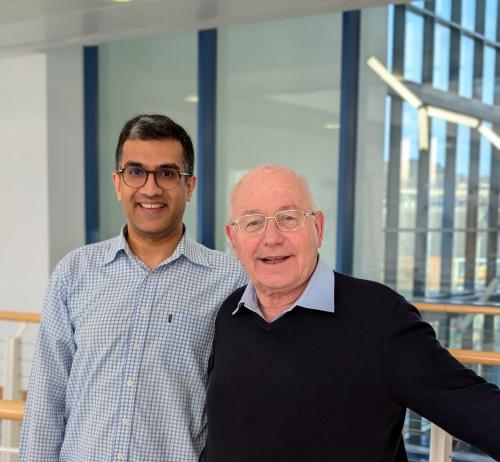
Arpan Mehta and Philip Cohen have been awarded grants totalling over £1 million to develop aspects of their research programmes.
Arpan Mehta and Philip Cohen have been awarded grants totalling over £1 million to develop aspects of their research programmes, aimed at understanding how mutations in particular protein kinases cause human diseases. The two-year grants have been awarded by the WoodNext Foundation, a component fund administered by the Greater Houston Community Foundation in the USA.
Arpan will develop new research ideas on mutations in the protein kinase NEK1 that cause amyotrophic lateral sclerosis (ALS), the most common type of motor neuron disease, while Philip will develop his research on mutations in the protein kinase ALPK1, which cause ROSAH syndrome, a disease that leads to blindness in young adults.
ALS is a paralysing illness of mid-adulthood, which affects approximately one in every 400 people during their lifetime. It causes motor neurons in the brain and spinal cord to degenerate and, once the first symptoms are detected, average life expectancy is only three years. Treatments are very limited and there is no cure, and so there is a major impetus to understand the causes of the disease. Variations in over 40 genes have been identified to cause ALS, several of which encode protein kinases or other proteins with which they interact. This suggests that abnormalities in protein phosphorylation are likely to underlie neurodegeneration in ALS. NEK1 encodes a protein kinase and is one of the more common genetic drivers of ALS. Arpan’s goal is to undertake research to better understand how NEK1 is involved in regulating the biology of motor neurons and how this impacts ALS. His motivation as a practising clinical neurologist is to develop a framework of knowledge that can be exploited to accelerate understanding, diagnosis, and treatment of people with ALS in the future.
Commenting on his award, Arpan said, "I am extremely grateful to the WoodNext Foundation for their investment in my project on motor neuron disease aimed at understanding how deregulation of the signalling pathways of the NEK1 protein kinase cause this devastating disease. The funding will also enable me to obtain the data needed to strengthen my chances of receiving an intermediate clinical research fellowship in the future.”
ROSAH syndrome is a rare but still underdiagnosed disease, first recognised as a distinct syndrome only five years ago. Since then, over 70 cases of this autosomal dominant disorder have been reported. Normally, ALPK1 is only activated by bacterial metabolites during microbial infection, but Philip and his team discovered that the disease-causing mutations allow ALPK1 to also be activated by several human metabolites, causing chronic inflammation without any microbial infection. The aim of the project is to use this new knowledge to develop key reagents and research tools that may facilitate the development of drugs to prevent blindness in patients with ROSAH syndrome.
Commenting on his award, Philip said, “I was delighted to learn that the WoodNext Foundation had decided to fund my research into the cause of ROSAH syndrome, because obtaining research grants to work on rare diseases can be challenging, despite their debilitating effects on the affected individuals.”
Nancy Chan, executive director of the WoodNext Foundation, which manages the philanthropy of tech innovator and Roku CEO/founder Anthony Wood and his wife, Susan, said: “We are proud to support high-risk, high-reward research such as the work of Drs Mehta and Cohen on protein kinases, as they play a critical role in regulating essential cellular processes. By investing in this innovative area of study, we aim to empower scientists to uncover groundbreaking insights into how these proteins contribute to health and disease.”
Protein kinases and human disease. There are more than 500 protein kinases in human cells, which regulate most aspects of cell life, and mutations in these enzymes cause cancers and other diseases. Over the past 24 years, over 100 new drugs have been approved for clinical use that switch off the functions of one or more protein kinases. These drugs have transformed the clinical care of many cancers including leukaemia, gastro-intestinal tumours, melanoma and lung cancer and their sales in 2023 exceeded $US 60 billion. It is expected that many other kinase inhibitors will be developed during the 21st century that will have a similar positive benefit on the treatment of many other diseases ( https://pmc.ncbi.nlm.nih.gov/articles/PMC8127496/ ).
About the WoodNext Foundation
The WoodNext Foundation manages the philanthropy of tech innovator and Roku CEO/Founder, Anthony Wood, and his wife Susan. Their philanthropic efforts are guided by their overall mission to advance human progress and remove obstacles to a fulfilling life. The WoodNext Foundation makes grants and investments in a variety of areas, including scientific and biomedical research, mental health, homelessness, education, nature conservation, disaster recovery, and economic opportunity, with a focus on addressing root causes.

